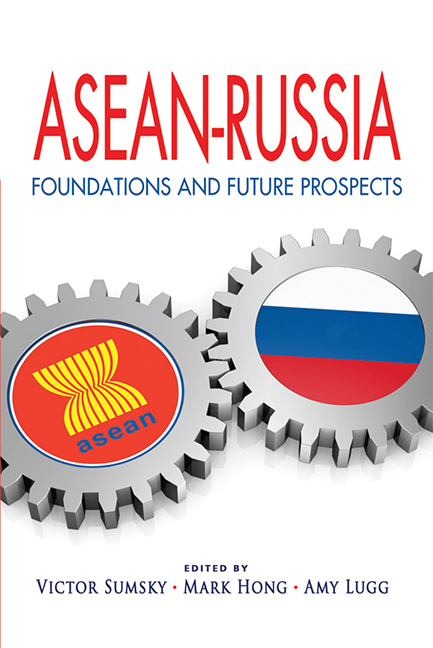Book contents
- Frontmatter
- Contents
- Foreword
- Preface
- About the Contributors
- Keynote Address
- Opening Remarks
- Keynote Address
- Introduction: Russia and the ASEAN Member States: Political and Economic Cooperation in Progress
- SECTION I WISEMEN'S VIEWS
- From Energy Partnership to Comprehensive Security in the Asia Pacific
- The Rise of Asia and Russia's Options
- ASEAN Regionalism and the Future of ASEAN-Russia Relations
- Thoughts on Asian Community Building
- Welcoming Russia's Participation
- SECTION II GEOPOLITICS
- SECTION III BILATERAL RELATIONS
- SECTION IV Business and Economics
- SECTION V CULTURE AND EDUCATION
- EPILOGUE
- Index
ASEAN Regionalism and the Future of ASEAN-Russia Relations
from SECTION I - WISEMEN'S VIEWS
Published online by Cambridge University Press: 21 October 2015
- Frontmatter
- Contents
- Foreword
- Preface
- About the Contributors
- Keynote Address
- Opening Remarks
- Keynote Address
- Introduction: Russia and the ASEAN Member States: Political and Economic Cooperation in Progress
- SECTION I WISEMEN'S VIEWS
- From Energy Partnership to Comprehensive Security in the Asia Pacific
- The Rise of Asia and Russia's Options
- ASEAN Regionalism and the Future of ASEAN-Russia Relations
- Thoughts on Asian Community Building
- Welcoming Russia's Participation
- SECTION II GEOPOLITICS
- SECTION III BILATERAL RELATIONS
- SECTION IV Business and Economics
- SECTION V CULTURE AND EDUCATION
- EPILOGUE
- Index
Summary
This chapter gives a regional perspective on the prospects of the Association of Southeast Asian Nations’ (ASEAN) relations with Russia. It looks at how the accomplishments of ASEAN and its central role in broader regional arrangements present new opportunities for the future of ASEAN-Russia relations.
ASEAN'S REGIONALISM EFFORTS
Mechanisms like the ASEAN Regional Forum (ARF), ASEAN Plus Three (ASEAN+3), and the more recent East Asia Summit (EAS) are where ASEAN procedures and the “ASEAN Way” dominate: ARF for security discussions, ASEAN+3 for community-building in economic and functional areas, and the EAS adding a broader strategic dimension to the ASEAN+3 process. Each of these forums contributes to new approaches in addressing issues and challenges that ASEAN faces, and new opportunities for ASEAN leadership in the twenty-first century.
ASEAN is the driver occupying a central seat in these regional processes. It also serves as a bridge between the newer ASEAN states and the Dialogue Partners. ASEAN gave renewed momentum and justification to Dialogue Partners that desired to continue to be politically engaged with Southeast Asia through development assistance but could not justify to their electorates assistance to a region with members enjoying higher per-capita incomes than they do.
The ASEAN Secretariat describes these processes as part of ASEAN's “concentric approach” to ensuring the peace, security and prosperity of the region.
ASEAN is now in transition. The influence of ASEAN's founding generation has gradually ceded to second or third generation leaders at ASEAN's helm with different takes on the ASEAN way and regionalism, spurred by the growing imperatives for reform and change in each country. With the entry into force of the ASEAN Charter, ASEAN members will now have to balance issues such as governance, human rights and democracy with tensions generated by the pressures of change.
Building on its formal and informal mandates and mechanisms to deal with regional issues, as well as its willingness to learn from its shortcomings and retool itself, ASEAN is now embarking on new forms of regionalism.
- Type
- Chapter
- Information
- ASEAN-RussiaFoundations and Future Prospects, pp. 22 - 30Publisher: ISEAS–Yusof Ishak InstitutePrint publication year: 2012



